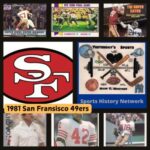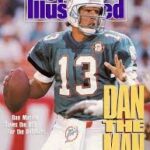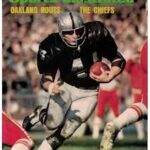The Tampa Bay Buccaneers began as an expansion team in the NFL in 1976. Although all expansion teams tend to struggle in their inaugural season, the Buccaneers did not merely struggle; they lost every game, finishing the season with zero wins and 14 losses. They then suffered twelve straight losses in 1977 before winning their last two games.
It marked the second-longest losing streak in NFL history, nearly surpassing the Chicago Cardinals’ 29-game losing streak from 1942 to 1945. Even more humiliating was that in 11 of the 26 games, the Buccaneers failed to score a single point. When asked about his team’s execution, Head Coach John McKay responded, “I’m all for it.”
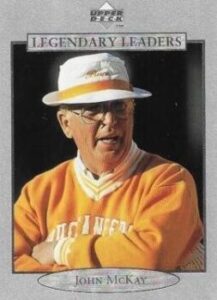
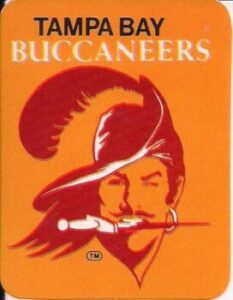
The team showed improvement in 1978, finishing the season with five wins and eleven losses. They still had a long way to go, but at least they showed progress.
LISTEN ON YOUR APP OF CHOICE
1979 Tampa Bay Buccaneers
Tampa Bay opened the 1979 season by dominating the Detroit Lions 31–16. The Buccaneers’ defense limited Detroit to 231 total yards. Defensive end Lee Roy Selmon scored a 29-yard touchdown on a fumble recovery. Tight end Jimmy Giles scored on a 66-yard touchdown reception, and rookie running back Jerry Eckwood rushed for 121 yards on 20 carries.
The Tampa Bay defense delivered another strong performance in a week two matchup against the Colts. They limited Baltimore to 206 yards, recorded 10 sacks, and had two interceptions. Cornerback Mike Washington returned one of those interceptions 49 yards for a touchdown.
On the offensive side, wide receiver Gordon Jones scored on a 37-yard touchdown reception. Kicker Neil O’Donoghue kicked the winning field goal in overtime, securing a 29–26 victory for the Buccaneers.
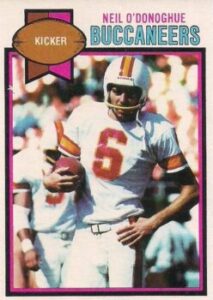
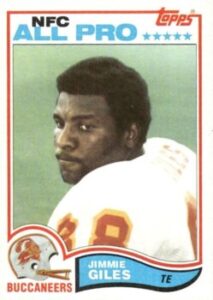
Jerry Eckwood and Rickey Bell had an impressive day running the ball in week three. Bell rushed for 97 yards on 15 carries and scored two touchdowns. Eckwood rushed for 99 yards on 23 carries, including a 40-yard touchdown run. The Buccaneers’ defense held Green Bay to just 89 yards rushing in a 21–10 victory.
Although the Tampa Bay offense didn’t perform at its best, the defense maintained its stellar performance, limiting the Rams to 186 yards and forcing four turnovers in this 21–6 victory.

Behind strong blocking, Jerry Eckwood had another exceptional game, rushing for 120 yards on 23 carries, including a 61-yard touchdown run. Eckwood also contributed an additional 46 yards receiving. The Buccaneers’ defense restricted the Bears to 234 yards in this 17–13 victory.
Undefeated After 5 Weeks, But Would It Last?
Tampa Bay traveled to New Jersey in week six, boasting a 5–0 record. They were upset by a struggling NY Giants team. The Buccaneers’ defense held the Giants to just 18 yards passing, but they couldn’t stop running back Billy Taylor, who rushed for 148 yards on 32 carries and scored two touchdowns.
The Buccaneers’ offense couldn’t get much going, and quarterback Doug Williams had a poor performance, completing 14 of 38 passes for 182 yards while throwing three interceptions.
The Buccaneers’ defense struggled to stop the run for the second consecutive week, allowing 234 rushing yards. Ricky Bell rushed for 101 yards but managed only ten carries. The Buccaneers turned the ball over four times and were never in the game, losing decisively 42–14 to the Saints.
After two consecutive losses, the Buccaneers needed a win to restore their confidence. The Buccaneers’ defense limited Green Bay to just 38 yards rushing and secured three interceptions. Doug Williams threw the ball only ten times, completing six of them, two of which were touchdowns.
Most importantly, he didn’t throw any interceptions. Ricky Bell had his best game of the season, rushing for 167 yards on 28 carries. The final score was Tampa Bay 21, Green Bay 3.

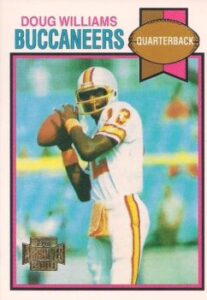
In a week nine victory against the Vikings, the Buccaneers’ defense struggled to stop receiver Ahmad Rashad, who caught seven passes for 117 yards. However, the Buccaneers limited the Vikings to ten points and registered four sacks. Doug Williams passed for 267 yards, while Issac Hagins caught five passes for 149 yards in the 12–10 win.
The Buccaneers’ week ten loss to the Falcons resembled their previous two defeats. The Falcons dominated possession, running the ball 46 times for 212 yards. The Buccaneers’ defense, which had performed well earlier in the season, was now faltering. The final score was Atlanta 17, Tampa Bay 14.
In a week eleven game against the Lions, the Bucs’ defense struggled to stop receiver Freddie Scott, who caught nine passes for 148 yards, but they effectively shut down the Lions’ running game, limiting them to only 38 yards. Trailing 14–9 in the fourth quarter, backup receiver Larry Mucker caught a 23-yard touchdown pass to secure the win for Tampa Bay.
Rematch vs. Giants
Week twelve featured a rematch with the Giants. The Buccs had struggled in their previous encounter with New York six weeks prior and were eager for revenge. The Buccs’ defense executed flawlessly in this game, limiting the Giants to just 200 total yards, forcing four turnovers, and sacking rookie quarterback Phil Simms five times.
Linebacker Dave Lewis returned a fumble 39 yards for a touchdown. Doug Williams connected with Larry Mucker for a 42-yard touchdown. Ricky Bell rushed for 152 yards on 22 carries as Tampa Bay cruised to an easy 31–3 victory.
The following week, the Buccaneers outgained the Vikings 425 yards to 268 but still lost the game. Ricky Bell surpassed the 100-yard mark again, gaining 101 yards and scoring a touchdown. He added another 43 yards receiving. Trailing by seven points late in the game, Doug Williams ran for a 13-yard touchdown. It appeared the game would go into overtime, but the Vikings blocked the extra point, resulting in a final score of 23–22.
The Buccaneers’ defense played well in a Week 14 game against the Bears, limiting them to 164 total yards and ten first downs. However, the Buccaneers’ offense struggled, and Doug Williams had his worst game of the season, completing only 5 of 19 passes for 60 yards. He also threw four interceptions in the 14–0 loss.
In a week 15 game against the 1–13 SF 49ers, Doug Williams threw five interceptions, prompting Bucs fans to call for a quarterback change as Tampa Bay suffered its third consecutive loss, 24–7.
A heavy rain at Tampa Stadium turned the field into a swamp. The Bucs played a game of ball control, running the ball 62 times. Ricky Bell carried the ball 39 times for 137 yards. The Chiefs were limited to only 35 plays from scrimmage and gained a measly 80 yards in total offense. The Bucs won 3–0, clinching first place in the NFC Central Division.
Despite the team’s 10–6 record, Lee Roy Selmon was the only player from the Buccaneers selected for the Pro Bowl and recognized as an All-Pro. Although no offensive linemen received much recognition, the Bucs’ line permitted only seven sacks throughout the season.
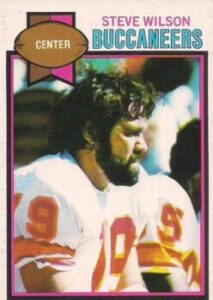
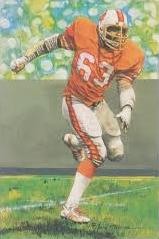
1979 NFL Playoffs
Their opponent in the playoff game was the Philadelphia Eagles. The Eagles were on fire, winning six of their last seven games, while Tampa Bay had lost four of their previous seven. Most people expected a Philadelphia victory. They were wrong!
The Bucs’ defense held the Eagles to a total of 227 yards. The Bucs’ offense controlled the ball, just as they had done one week earlier against the Chiefs. Workhorse Ricky Bell carried the ball 38 times for 142 yards and scored two touchdowns. The final score was Tampa Bay 24, Philadelphia 17.
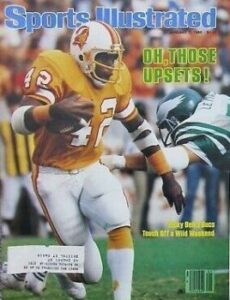
1979 NFC Championship Game
The Tampa Bay Buccaneers, who had a record of 7 wins and 37 losses in their first three seasons, were just one win away from reaching the Super Bowl. Their opponent would be the LA Rams, another team nobody expected to be here. The Rams’ record stood at 5–6 after eleven games, but they finished the regular season at 9–7. This mediocre record was enough for first place in a weak NFC Western Division. No one believed they could defeat the Dallas Cowboys in the playoff game, yet they did.
The two teams met in week four, and the Bucs won easily. In that game, the Bucs shut down the Rams’ running attack, but this time it was different. The Rams controlled the ball effectively, running 53 times for 216 yards. They also contained Ricky Bell, who managed 59 yards on 20 carries. The Bucs struggled offensively without a potent passing offense, gaining only 177 yards. Ultimately, the Rams secured the victory with three field goals, 9–0.
Following The 1979 Season
While losing is always disappointing, the Buccaneers had much to be proud of during a season that no one could have ever anticipated.
Unfortunately, the Bucs fell back into their losing ways the following season, achieving only three winning seasons over the next nineteen years. In 1999, they returned to the NFC Championship game, coincidentally facing the Rams again, but lost in another low-scoring match, 11–6. Three years later, they won the Super Bowl, and in 2020, they claimed their second Super Bowl title.
Mark Morthier is the host of Yesterday’s Sports, a podcast dedicated to reliving memorable sports moments from his childhood days and beyond. He grew up in New Jersey just across from New York City, so many of his episodes revolve around the great sport’s teams of the 70s for the New York area.
He is also an author of No Nonsense, Old School Weight Training (Second Edition): A Guide for People with Limited Time and Running Wild: (Growing Up in the 1970s)

BOOKS BY MARK MORTHIER
Please Note – As an Amazon Associate I earn from qualifying purchases
More From Yesterday's Sports
1981 San Fransisco 49ers: First Super Bowl Victory
The San Francisco 49ers franchise began in 1946 in the...
Read MoreMonday Night Football Early Years (1985 – 1991)
Before we jump into Monday Night Football from 1985 thru...
Read MoreMonday Night Football Early Years (1979 – 1984)
Before we jump into Monday Night Football from 1979 thru...
Read MoreMonday Night Football Early Years (1974 – 1978)
Before we jump into Monday Night Football from 1974 thru...
Read More